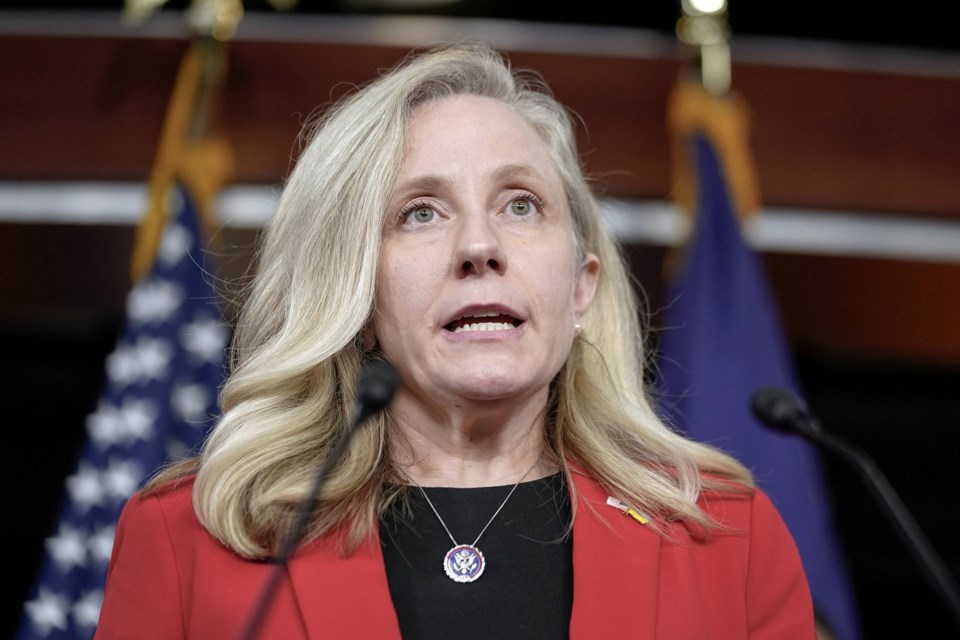RICHMOND, Va. (AP) — Virginia Democrats vying to shield their statehouse majority and flip the governor’s mansion in November raised millions of dollars more than Republicans in the first three months of 2025, according to newly released campaign finance reports, securing a cash advantage in their pursuit of voters frustrated with Republican tech billionaire Elon Musk.
For months, Democrats have tailored their campaigns around anti-Musk sentiment in Virginia, pushing ads blasting his initiative to overhaul federal spending during President Donald Trump's administration.
And campaign finance reports released on Tuesday suggest their strategy may be helping their cash flow: Former U.S. Rep. Abigail Spanberger raised $6.7 million between January and March, according to the nonpartisan Virginia Public Access Project. Democrats also raised more than $3.7 million during those months toward , in which all seats of the lower chamber are on the ballot.
Del. Dan Helmer, the House Democrats’ campaigns chair, said following the reports' publication that the GOP "agenda is out of step with Virginians, and no last-minute attempt to distance themselves from President Trump and Elon Musk will save them.”
Republicans raised roughly $2.2 million less than Democrats in the House races, according to VPAP. Republican Lt. Gov. Winsome Earle-Sears’ gubernatorial campaign brought home a little over $3.1 million, though, unlike Spanberger, she was unable to raise money during Virginia's 45-day legislative session.
In a statement, a spokesperson for Earle-Sears' campaign said: “We'll have the resources we need to share Winsome's story and take the case directly to voters — and that includes holding Abigail Spanberger accountable for her failures in Washington. This is just the beginning.”
The first-quarter financial reports reflect the national attention — and money — pouring into Virginia's off-year races. by Musk and the Department of Government Efficiency because it's where many federal workers live. Changes to the federal government have already sparked frustrations among Virginians, who have decried the changes during town halls and community meetings.
“Virginia elections are often about angry voters, and the most angry group of voters is the party who lost the White House the year before,” said Stephen Farnsworth, a political science professor at the University of Mary Washington. “Democrats are angry, and they’re putting their money where their irritation is.”
Behind some donations are , such $100,000 from venture capitalist and LinkedIn cofounder Reid Hoffman. CEO Martha Samuelson gave another $100,000. Spanberger's largest donors so far this year were two political action committees: $500,000 from VoteVets Federal PAC and $250,000 from the American Federation of State, County and Municipal Employees Working Families Fund.
Earle-Sears' came from Florida-based billionaire Thomas Peterffy. Former U.S. House Speaker Kevin McCarthy also contributed $50,000 to the lieutenant governor's coffers, and a political group affiliated with former U.N. Ambassador Nikki Haley also chipped in $5,000.
Among the slew of Earle-Sears' conservative donors, there is one person notably missing: Musk himself.
Musk and his affiliated groups have not yet contributed to Virginia's elections, according to a list of donors provided by VPAP. His absence comes after he and those groups into flipping the to conservative control in early April, only to see his candidate lose by 10 percentage points.
“One of the big questions about the Virginia election this year is whether Elon Musk will weigh in like he did in the Wisconsin Supreme Court election recently,” Farnsworth said, later adding: “The question really is whether Musk will view Virginia as a good investment.”
___
This story was first published on Apr. 17, 2025. It was updated on Apr. 21, 2025 to correct that state Del. Dan Helmer is the Virginia House Democrats’ campaigns chair. Minor editing to conform.
___
Olivia Diaz is a corps member for The Associated Press/Report for America Statehouse News Initiative. is a nonprofit national service program that places journalists in local newsrooms to report on undercovered issues.
Olivia Diaz, The Associated Press




